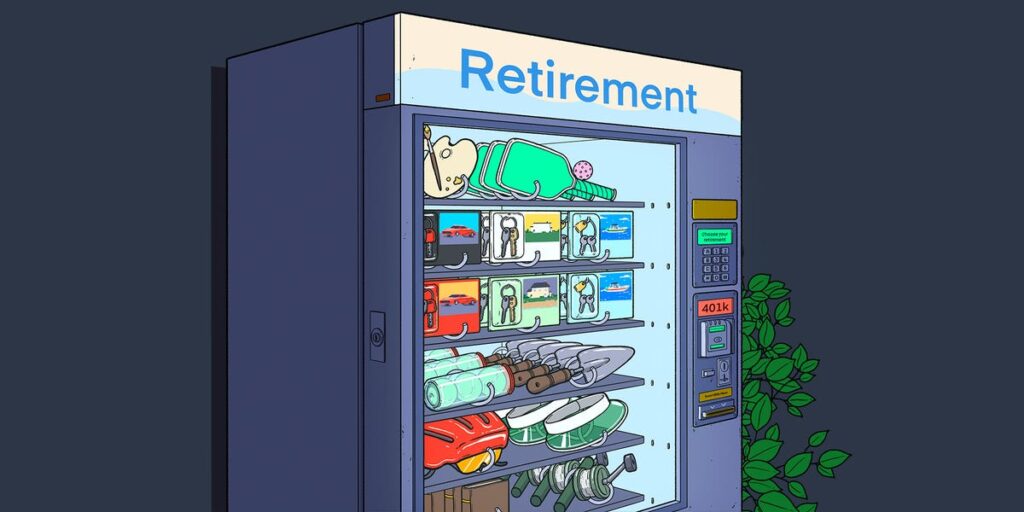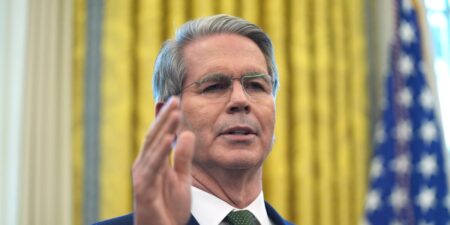Most 24-year-olds aren’t thinking too deeply about retirement. With decades of work ahead of them, most are focused on getting their footing in the workplace — not on the financial needs and life goals of their 65-year-old selves.
The same was true for me. Sure, I enrolled in a 401(k) and started to build an emergency fund, but I hadn’t really sat down and mapped out what my future would look like 40-some-odd years down the road. That all changed recently.
Over the past several months, including as part of Business Insider’s “Retirement Regrets” series, I spoke directly with over 200 older Americans, and another 4,500 retirees shared their stories via online forms. People generously recounted the pitfalls and successes of their own journeys to the golden years. Some painted a rosy picture of what the future may hold — traveling the world, volunteering for causes they admire, or spending more time with family. Others expressed regrets and struggles — working two jobs late into their 70s or 80s, caring for aging parents, or living in unstable housing situations.
At first, I wasn’t thinking much about my own retirement, but as I heard more stories, I began to wonder if I was already making mistakes I might one day regret.
After one woman told me she was too safe with her investments, I took most of my money from savings accounts and decided to plow it into the market — albeit via still-fairly-safe index and mutual funds. After a man said he regretted not maxing out his 401(k), I increased my contribution. But beyond the standard financial advice, the part of the stories that struck me most was how much time people spent talking about the psychological, social, and emotional side of retirement. Some told me they spent their whole lives working to spend their later years relaxing, only to realize they missed the self-fulfillment they got from their jobs. Others said they sacrificed travel or family to achieve wealth, only to get sick after retiring. A few said they’ve loved retirement even with little in the bank. These weren’t aberrations: Hundreds of respondents said the nonfinancial elements of retirement were the most important.
After talking with all these retirees, I realized there isn’t an ideal form of retirement. I can’t predict how my career will look, how long I’ll live, or what life has in store. I may screw up along the way, as many people told me they had, but there are ways to recover. My priorities between now and my 60s may change, or there may be a huge life event I don’t see coming. But from these interviews, including a dozen for this story, I actually feel significantly less anxious about my retirement planning than when I began. I better understand what I and my fellow Gen Zers should do to prepare for retirement — even if I don’t plan on playing golf.
While my conversations eventually reinforced the age-old canard that money can’t buy happiness, the hundreds of retirees I spoke to made it clear that there is a lot of value in financial stability. People stressed some basic tenets: save intently, live frugally, and plan for the long term. Admittedly, many Gen Zers who are on the lower rungs of the career ladder have little to invest because of meager starting salaries and high living costs. But even so, those further along in their journeys told me that learning the fundamentals of finance — whether through YouTube videos, books, or conversations with family and friends — is immensely helpful as the paychecks start to grow.
Kevin Foster, now 64, was earning a low-six-figure salary as a chemical and wastewater lab technician before he left the working world. While he regrets running up his credit cards and not maxing out his 401(k) earlier in his career, he amassed over $700,000 in savings by the time he retired, including the pension his job provided. The forethought turned out to be crucial: He was forced to end his career at 58 after developing a debilitating autoimmune disease. He started drawing Social Security Disability Insurance in 2020, which paid just over $3,000 monthly. Despite his illness, the combination of Social Security, savings, the pension, and his wife’s income means that the couple will be able to live comfortably for the foreseeable future.
“My grandson is turning 20, and he’s been working since he got his driver’s license,” Foster told me. “He’s got a little bit of cash, but I told him, ‘I don’t care how much you put away, you’ve got to put something away.'”
Beyond the basic advice to start early to take advantage of compounding interest over time, financial advisors disagree on the precise amounts to stash away. Fidelity says you should have three times your salary at 40 and 10 times your salary at 67, while T. Rowe Price suggests your total assets at 65 should be between 7.5 and 13.5 times your income. And while some advisors say to prioritize Roth IRAs, others say to focus more on 401(k)s.
You have to save your money early because you’ll need it in retirement. Try to sock some of your money away.
Chris Herman, the head of personal retirement at Merrill and Bank of America, stressed enrolling in employer-sponsored retirement plans if available but acknowledged that it can be tough for young people to focus on the long term, especially as crises arise.
“A very large percentage of people in their 20s will lose their job against their will at some point in their career. You want to be prepared for that,” Herman said.
Donna Davis, 71, learned that lesson the hard way. The single mother worked as a teacher and held odd jobs doing catering and working at day cares but could never save much each month. She knew little about the stock market, exhausted her Roth IRA to pay her bills, and returned to work two months after she retired for added financial security. She told me that she may need to work well into her 70s since her pension barely covers her mortgage, Medicare, and prescriptions. Despite the difficulties it may have caused at the time, she now wishes she had saved more in her younger years.
“Dreaming of retirement and the reality of retirement are two different things,” Davis said. “You have to save your money early because you’ll need it in retirement. Try to sock some of your money away.”
While a lot of retirees were dutiful about their planning, considered forethought wasn’t a cure-all. For some, an illness or disease halted their retirement progress. Others said a loved one’s death or a job loss set them back. Some struggled to secure white-collar work after a layoff and transitioned to living paycheck to paycheck. Many in my generation haven’t factored in these circumstances, and I’ve had to reconsider my own retirement outlook — I could save prodigiously and follow a calendar of life milestones, but something could always erase this progress.
Even if a catastrophic life event hurts my planning, I’ve found it healthy to accept that life is often unfair — as my mom told me growing up, “Man plans, and God laughs.” All I can do is live each day to the fullest, prepare for emergency costs, and listen to the stories of people like Barbara Moore-Peters.
Moore-Peters, 62, grew up poor and struggled in school, though she worked as a nurse for three decades while raising her children alone. She woke up blind one day in 2008, and though she gained partial vision back, she struggled to hold a job with her condition. There’s no cure for her neuromuscular disease, and she’s unsure how she’ll stay afloat on disability. Despite the financial worries, she said her children and grandchildren make her retirement years worthwhile.
“The only thing I have is my legacy,” she said. “When I feel really down, I drive to Ohio to see my grandkids and my daughters and get hugs and kisses.”
Increasingly, I found myself chatting with people about the emotional fulfillment — or lack of it — that comes with leaving a career. Given my workaholic gene and the genuine enjoyment I get from my job, there is a chance I may never fully retire. Even if I get to a point where I can comfortably ride off into the proverbial sunset, I might not want to. I get bored very easily. It’s why I’ve taken up marathon running, created trivia games, and aim to visit all 50 states by my 30s. I’m not alone in this: Two dozen of the people who spoke to BI said they’re working past retirement age with no intention of stopping. Many said that even as millionaires, they hope to keep going.
Louis Belline, 75, said he “failed retirement” five times. Belline retired in the mid-2000s after 25 years as a Delta Air Lines pilot before returning to flying as a pilot trainer and earning $130,000 a year. His wife happily retired five years ago, and the Georgia couple has a net worth in the mid-seven figures. But Belline said he may work until his late 70s because it keeps him sharp.
“I see people retire and sit down and die,” Belline said. “The biggest concern I have is I don’t want my brain to atrophy. I figure I can keep trucking and keep up with these younger people who are smarter than me.”
David John, a senior strategic policy advisor at AARP, said he’s seen many people retire enthusiastically only to realize they were bored or lost their purpose. He said adjusting to the loss can be tough, and the lack of social connection in retirement often pushes people back to work. About half of respondents in an AARP survey of unretired people said their decision to return to work was based on having “a purpose in life, a social network, and getting out of the house.”
Several retirees I spoke with were able to get creative in how they found purpose. Aida Porras, 67, lost her mother a few years ago and cared for her husband for five years after his stage four cancer diagnosis. She’d been laid off from her job as a healthcare consultant and had focused her attention on caring for her ailing mother. while providing consultation as an independent contractor. After her husband died, Porras took over the family art supply business in Georgia, which gave her a new circle of friends, sparked her interest in painting, and allowed her to flex her entrepreneurial muscles. It also helped her overcome her grief and stay focused on life’s joys. She said she doesn’t have a transition plan for her retirement, adding that many in her family lived into their 90s.
“I’ll have some extra cash, which will help me down the line,” Porras said. “At the end of the day, when I go to bed, I laugh and say, ‘Nobody can fire me.'”
Hearing stories like Porras’ and dozens of others made me realize that even if I don’t hit my financial milestones, I could always pivot and open a business, write a book, or even take on blue-collar work. There will always be something to give me financial and personal fulfillment.
Ultimately, the most important factor for a successful retirement seemed to be having a clear understanding of what makes me happy. In my interviews, many people said they were too ambitious upon retiring and blew through their reserves too fast, while others said they were too cautious and sacrificed their enjoyment. People who considered their retirement successful agreed that retirement is about fulfillment and purpose, whether realizing travel goals, finishing that last professional achievement, or having coffee weekly with a longtime friend. As someone who has frequently sacrificed my enjoyment to get further ahead financially, such as working a full-time job most semesters of college, I’m starting to do less in my spare time, backing off some commitments while prioritizing travel and health (though I’m not ignoring recent market moves entirely).
I did not come from wealth, nobody mentored me, I never made a lot of money, but I did almost everything I ever dreamed about doing.
My conversations have given me some pretty good models for what a truly successful retirement may look like. Take Bill Watts, 78, who told me he’s succeeded in retirement as a “regular guy” who didn’t make much money. Watts, who lives in Florida, sold insurance and mutual funds before spending 25 years in nuclear medicine, retiring at 67. He took advantage of IRAs early and never spent too much — he maintained his fishing boat for 30 years and went on international trips for cheap through careful planning. Upon retirement, he scuba-dived and bought a house in Seattle to be closer to his children, where he spends his summers. His $1.3 million nest egg has grown to about $1.8 million since he quit working, thanks to smart investing. And between travel and spending time with his wife of 53 years, he’s spent his late 70s reading, watching YouTube, and maintaining his houses.
“I did not come from wealth, nobody mentored me, I never made a lot of money, but I did almost everything I ever dreamed about doing,” Watts said.
Or perhaps my retirement could look like that of Lori Devlin, 68, who retired in 2021 after 36 years in the wine industry but took a “retirement job” as the village clerk in her Long Island town, handling the village’s records and doing administrative tasks. She said her net worth fell “into the negatives” during the 2008 financial crisis, but she grew it to well over $1 million by retirement through aggressive investing and her side income as the village’s elected trustee. Devlin said her retirement has been everything she’s dreamed of, even though her position pays much less than her previous role in the wine industry. She’s loved staying involved with local politics and bettering her community, and she plans to slow down once she takes Social Security at 70 to travel and spend time with her grandchildren.
I’m still 40 or so years out from retirement, but I’m using my mid-20s to think about how to spend my twilight years purposefully, even if it means not being a multimillionaire or spending my days surrounded by palm trees.
Are you a member of Gen Z who is already thinking about your retirement? Please fill out this quick form.
Noah Sheidlower is a reporter on Business Insider’s Economy team who led the Retirement Regrets series.
Business Insider’s Discourse stories provide perspectives on the day’s most pressing issues, informed by analysis, reporting, and expertise.
Read the full article here
















